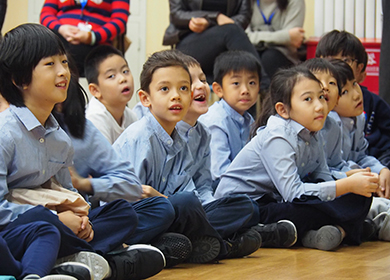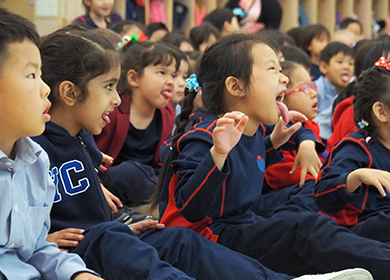Go Back
News
News
Building Literacy Through Storytelling
News
25 Oct, 2019
10 : 00
On Tuesday, New Zealand born storyteller, Andy Wright paid a visit to Yew Chung International School of Beijing, as part of our continued efforts to instill a love for literature and storytelling. His storytelling and subsequent performance of the Haka was centered on the story of New Zealand’s discovery by Maui, a demigod who after a voyage unearthed what is now known as the north and south sides of the island, to our enthralled Year 1 – Years 9 students.
Andy, whose upbringing was influenced by both Maori and British Isles cultures was inspired to become a storyteller first due to his upbringing by a blind mother who would tell stories to him, and later on by his then profession as a librarian.
With over two decades of storytelling, he shares what valuable lessons children can learn and some ways parents can instill a love of reading in their children using storytelling.
How does storytelling further contribute to students’ literacy?What we do know is that written and reading literacy is developed later in life. Oral is the first kind of literacy children learn, later on they then learn to read and write. The more you can tell stories to children, and get them to tell stories to you, the more that will improve their written and reading literacy later. Particularly for children who struggle to read; they will lose the sense of joy that comes from stories because the mechanics stand in the way of their enjoyment.
So, read them stories, tell them stories, get audiobooks, because then they continue to enjoy stories even though they find the mechanics of reading hard, this way. The more they enjoy stories, the more it will encourage them to overcome the difficulties of reading.
What can students learn from telling and being recipients of storytelling?The appreciation of our different cultures. The more stories we listen to about different cultures, people and different places, the more we understand the similarities between ourselves as humans - we are all the same.
How can parents instill a love of reading through storytelling? Please give us three tips.
- Making sure that children always remember that stories are playful. Teenage boys, especially, begin to see reading as something you do for information, therefore they lose the sense that it can also be enjoyable.
- Keep ensuring that they enjoy stories. Choose stories that are appropriate for them, even if it may not be the highest level of reading like War on Peace or George Orwell. This may be comic books, or any other subject they are interested in. What is important is that they are reading and enjoying it.
- With younger children, keeping the story playful such as how I was doing the Haka is a great way to tell stories by incorporating activity. By making it playful, it makes the children want to learn and read more about it whilst enjoying it.
What kinds of stories and which books would you recommend for parents who are just beginning to tell stories to their children?I would recommend folktales. They are the knowledge of our folk and ancestors. For example, the story of Maui in New Zealand, The West African stories of Anansi, and the story of The Magic Mill in China.
Margaret Read MacDonald has also written books about how to tell stories and has a collection of folktales for parents to use.
Parents should also tell true stories about their own lives, childhoods and families. Children are fascinated by the fact that their parents were once children as well.
To learn more about the importance of storytelling, click here.












